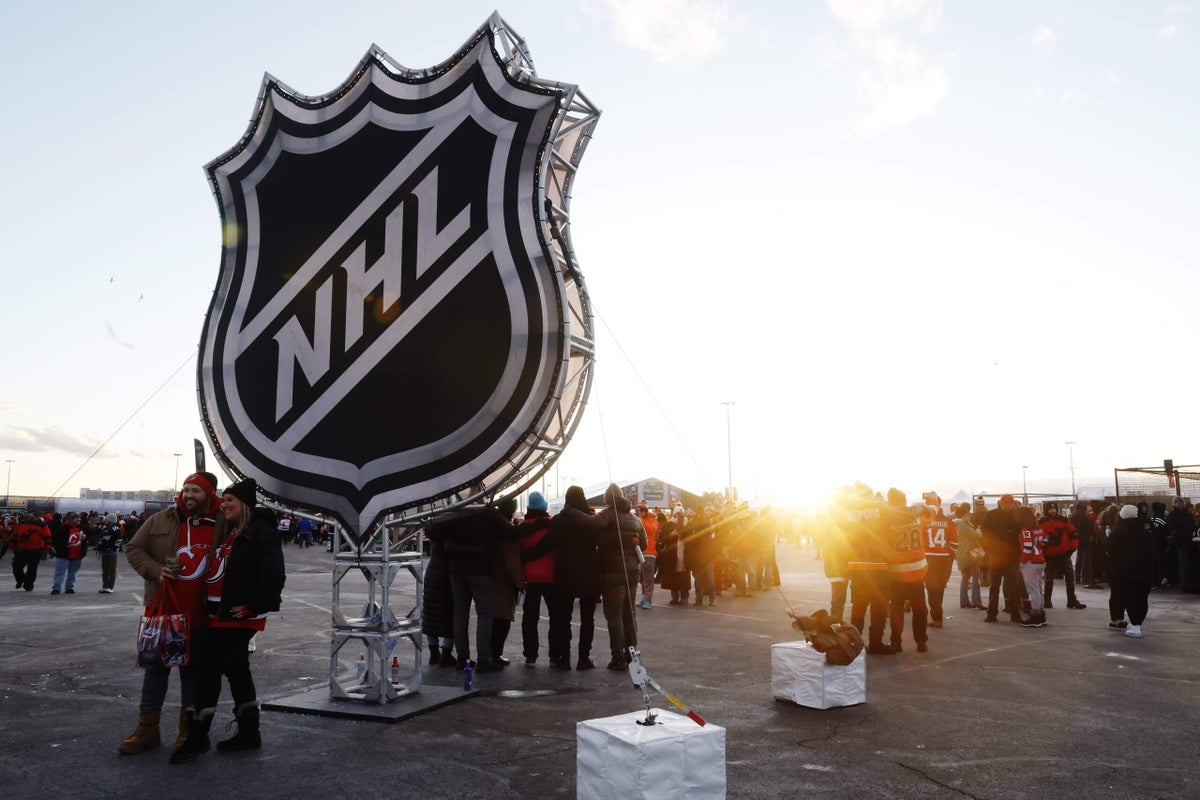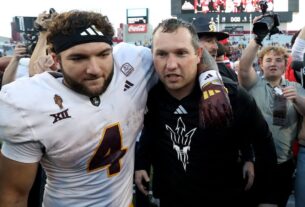Frank Vatrano’s three-year, $18 million contract extension with the Anaheim Ducks on Sunday highlighted a little-known salary deferral device in the NHL Collective Bargaining Agreement. Vatrano will be paid $3 million per season through the 2027-28 campaign, with the remaining $9 million paid out over 10 years starting in 2035.
By 2035, Vatrano can move out of California and avoid the state’s high income tax. The Ducks, meanwhile, benefit because Vatrano’s extension will only cost $4.57 million against the cap instead of the $6 million annual average value for which they’d normally be on the hook.
This salary deferral tool is one of many CBA rules, standards and parameters that fans may not be familiar with as this season plays out. The NHL CBA, an ironclad legal contract over 500 pages long negotiated between the players’ union and the league, governs the on- and off-ice rights, power, rules and conduct of players, clubs and the league in meticulous detail. It addresses many topics that fly under the radar, including player dress codes, the elite-level amenities and off-ice services they’re entitled to, extra perks related to pensions, rent/mortgages, rental cars, team rights and so much more.
Here are nine CBA rules you may not know about.
Waiver claims have a hidden financial cost
Relevant CBA section: Article 13.16
Waivers are often seen as a “free” opportunity to acquire borderline NHL players. While that’s true in the sense that the acquiring team doesn’t have to surrender any draft picks, prospects or active players, the process isn’t entirely free.
When a team makes a successful waiver claim, it must pay a cash fee to the club losing the player, as per the CBA. This is an interesting wrinkle because teams are forbidden to include cash in trade proposals, in comparison.
Waiver prices vary heavily based on how many cumulative years a player has completed under one or more NHL contracts. Players with less experience are more expensive to claim off waivers, presumably because they’re usually younger and have more potential upside. Goalies with fewer than five years of experience also have higher waiver prices compared to forwards and defensemen with equivalent experience.
Waiver Prices for Goalies
| Waiver Price | Years of Experience |
|---|---|
|
$90,000 |
2 |
|
$75,000 |
3 |
|
$67,500 |
4 |
|
$63,750 |
5 |
Waiver Prices for Skaters
| Waiver Price | Years of Experience |
|---|---|
|
$67,500 |
2 |
|
$56,250 |
3 |
|
$41,250 |
4 |
|
$26,250 |
5 |
Data courtesy NHL CBA
Beyond five years of experience, waiver prices fall dramatically and position no longer matters. It costs less than $3,500, for example, to claim a player with 10 years of experience. That’s pocket change compared to some of the numbers in the first two tables.
Waiver Prices for Veterans
| Waiver Price | Years of Experience |
|---|---|
|
$15,000 |
6 |
|
$13,125 |
7 |
|
$11,250 |
8 |
|
$7,500 |
9 |
|
$3,375 |
10+ |
These waiver prices aren’t high enough to deter general managers from claiming worthwhile players, but they’re not completely insignificant either. Remember that a few ownership groups have carried reputations in the past for pinching pennies. It’s possible a waiver claim or two could be equivalent to the cost of a full-time scout’s annual salary, for example, and that’s before you account for other reimbursements (more on that later) and amenities clubs owe to newly acquired players.
Rent/mortgage expenses are reimbursed for up to six months for transferred players
Relevant CBA section: Article 14.2
When a player is transferred (i.e. traded, acquired via waivers, called up from the minors, etc.) from one team to another, he is entitled to certain privileges to keep his cost of living manageable. The easiest way to explain this would be to give a hypothetical example.
Let’s say a player is traded from Toronto to Los Angeles and obtains a new residence in L.A. If the player still owes a monthly rent or mortgage for a prior residence in Toronto, the Kings would be obligated to pay for it. This ensures that the player isn’t paying rent/mortgage for two residences in separate NHL cities at the same time. The player will receive this rent/mortgage relief for his old residence for a maximum of six months.
Teams were on the hook to reimburse up to a maximum of $4,000 per month for rent/mortgage for the 2012-13 season under the 2013 CBA, with amounts rising for later seasons. When the CBA was extended in 2020, players negotiated an increase of this number — teams now cover up to a maximum of $5,600 per month for the 2024-25 season.
Players are not eligible for reimbursement if they have a fully paid-off mortgage for the residence in their prior NHL city.
How players earn extra cash (besides their salary) on the road
Relevant CBA section: Article 19
Players are given a per diem meal allowance when they travel on the road. It began at $100 per day in 2013 — per diem is half of that on game days because teams provide game meals — and increases every year based on the inflation reported by the U.S. Consumer Price Index. I’d estimate that figure to be around $135 per day for this season based on U.S. CPI data over the last decade.
The per diem is usually distributed via cash in envelopes. This can make for some extra pocket change because players don’t need to buy many meals on the road. Teams typically provide free meals on game days, while transporting via plane or bus and sometimes even after practices on non-game days. Players will buy some meals on non-game days, but the per diem allowance is generous, all things considered.
Jake DeBrusk estimated that he would have racked up approximately $5,500 over the 2018-19 regular season if he never touched his per diem. That isn’t a huge total to NHL players on six- and seven-figure salaries, but it is extra cash that can go toward a vacation or specialized offseason training, for example.

Columbus’ Kirill Marchenko signs autographs for fans before a Blue Jackets game. (Samantha Madar / USA Today Network via Imagn Images)
Teams are allowed to fine players for denying autograph requests or coming into training camp overweight
Relevant CBA section: Exhibit 14 and Article 30.8
The CBA includes a standardized list of about 15 conduct-related rules that every team can enforce against players. Any violation of these rules can result in the club fining the player $250, with the money held toward use at a team function for players or donated to a charity of the player’s choice.
One of those 15 rules is that players must treat fans with “respect and courtesy” and that “autograph requests in the vicinity of Club facilities should not be unreasonably denied.” I’d be really surprised if teams actually fine players for this, but it’s still interesting that fulfilling reasonable autograph requests is technically a legal obligation for players.
Some of the other notable club rules: Alcohol consumption is prohibited on team flights, airports and hotels unless authorized by the head coach or general manager; players must wear a formal jacket, ties and dress pants to all games and while traveling to and from games; players must adhere to the team’s curfew policy on the road; and the use of any tobacco products “while in the presence of fans in any arena or while attending any team function is prohibited.”
Article 30.8 also notes that clubs can issue a “reasonable fine” if a player reports to training camp in an “overweight condition.” Players almost always arrive to camp in exceptional shape, so again, I don’t imagine this fine is doled out often (if at all), but it is a fascinating right teams have.
Free hotel accommodation for players called up from the minors
Relevant CBA section: Article 13.12
Imagine you’re a fringe NHL-caliber player who just got called up from the minors. You have no idea how long your NHL stay will be — it could be the whole season if you make a strong impression, or it could be less than a week if you underperform and/or if injured players are ready to return. With all the uncertainty around your length of stay in this new NHL city, how can you possibly sign a lease to rent a place to live?
Teams must provide the player with a “reasonable single hotel room” to live in for up to 28 days to account for this. By the 28th day, the NHL team is required to send the player a letter (while also sending a copy to NHL Central Registry and the NHLPA) notifying them whether they will stay with the NHL team permanently. If a player receives that letter stating they’re sticking with the big club, they’re now free to obtain a residence and move their household goods and family. The club will reimburse the player for reasonable moving expenses.
Living in a single hotel room for those 28 days is challenging. I’ve spoken to players who said they ate out for nearly every meal while living in the hotel because they didn’t have a kitchen area. It’s especially challenging for players who are separated from their families.
If a player reaches the 28th day and the NHL team is still unsure whether he will stay with them for the foreseeable future, they can request another 28 days to make a decision. In that scenario, the club will need to upgrade the player’s hotel room to ensure it has a kitchen area and at least two bedrooms if he wishes to be joined by his spouse and children.
Teams can still send a player down even after they’ve sent a letter informing him to get a place to live in the NHL team’s home city. There are, in fact, countless stories where players think they’ve made the NHL permanently because of this letter only to be sent down shortly later. But if a club does that, it will be on the hook to pay for the player’s rent in the NHL city, so it has a clear financial penalty on the team.
If a player is sent back to the minors, the NHL team must provide the player with a hotel room to live in at the minor league team’s home city for a period of up to 28 days as well. This ensures players going down to the AHL have time and opportunity to find a residence.
Players are entitled to free tickets for home games, but not on the road
Relevant CBA section: Article 20
I’m sure everybody already assumed players get free tickets to distribute to family or friends, but interestingly, the CBA specifies the exact parameters in writing.
Every NHL team is required to make two free tickets available for every player for every home game and an additional two tickets for purchase per player on the home team. Teams can’t just set aside nosebleed tickets, either — the CBA stipulates they must be lower-bowl seats at worst.
Players aren’t, however, entitled to free tickets on the road. The home team must leave two tickets available per player on the road team, but they are for purchase, not complimentary. Connor Bedard, for example, had to pay a decent chunk of money to cover ticket requests from all of his friends and family for his first game in his hometown of Vancouver.
Connor Bedard on his ticket requests for his homecoming game Saturday in Vancouver: “Nothing crazy, but I’ll be paying to play for a day.”
— Ben Pope (@BenPopeCST) November 13, 2024
Players can’t play certain recreational sports without written consent from the team
Relevant CBA section: Exhibit 1 (standard player contract)
The NHL’s standard player contract states that players are not permitted to play “football, baseball, softball, hockey, lacrosse, boxing, wrestling or other athletic sport without the written consent of the club.” This appears to apply even when these sports are being played at a recreational level. Clubs aren’t allowed to “unreasonably” withhold consent when a player requests permission to play another sport.
In late 2020, Evander Kane challenged boxer Jake Paul to a fight while naming a specific date and city. Paul didn’t ultimately entertain the proposal, but had it been agreed to, Kane wouldn’t have been allowed to participate in the fight unless the Sharks, who had him under contract at the time, granted him written permission. That’s a high-profile example of where this part of the NHL standard playing contract would have potentially come into play.
The perks of being an emergency backup goalie or a player on a training camp tryout
Relevant CBA sections: Exhibit 17 and 17-A and Page 47 of MOU
Players invited to training camp on a tryout (PTO or ATO) are entitled to certain benefits.
Teams will pay round-trip travel expenses from the player’s summer residence to the training camp location as well as accommodation, per diem and meals. The club is also responsible for any medical or dental costs associated with treating any injuries suffered at camp. They must also provide a $50,000 insurance benefit if the tryout player suffers a hockey-related injury at camp that causes “permanent total disability.”
Beyond that, players on tryout aren’t entitled to any compensation.
What about emergency backup goaltenders who end up dressing in a game? Well, it depends on whether he’s deemed a professional or amateur goalie.
David Ayres, for example, infamously backstopped the Carolina Hurricanes to a victory over the Leafs in 2020. Ayres had no prior professional experience, so he was on an amateur contract. Amateur deals make it clear that teams are not permitted to give the player money or compensation of any kind.
Goalies on a one-day professional deal, however, are given $500 and allowed to keep their game-worn jersey.
Transferred players get a free rental car for 21 days
When a player is transferred (i.e. traded, acquired via waivers, called up from the minors, etc) from one team to another, the team must provide a “mid-size rental car” for a period of up to 21 days. The team is permitted to choose the rental car company.
The player can decide to rent a more expensive, luxurious car, but in that case the club is only required to reimburse the player an amount equivalent to what a mid-size rental car would be.
This is a key benefit because players in this 21-day timeframe are often living out of a hotel, acclimating to a new city and can breathe much easier knowing they at least don’t have to worry about transportation for a while.
(Top photo: Sarah Stier / Getty Images)





